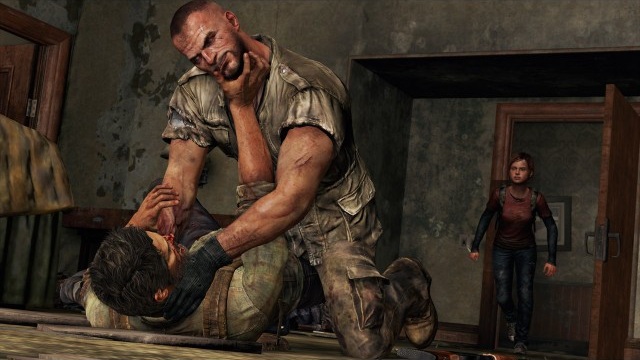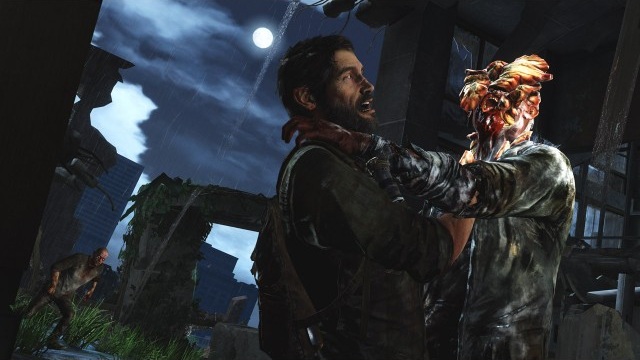Streaming, gushing, pooling.
Blood does many different things in The Last of Us. It streams down Joel's face when an enemy tears the flesh from his neck. It gushes out of any number of important arteries from a decapitated foe. It pools around the humans perforated with a shotgun and glistens with the light's reflection. In one scene, fellow survivor Bill lops the head off a zombie, and as Joel pushes the newly headless corpse off, blood soaks its shirt collar and spreads as it would in real life. Unlike the liquid freedom of blood, though, your options in a world mangled and destroyed by the Cordyceps fungus—a real fungus that behaves as it does in the game, even if it can't turn people into bloodthirsty monsters in real life—remain limited.
Here are the options: stay in a highly militarized quarantine zone and deal with the oppressive military organization that continues to guarantee your safety, join up with any number of different gangs looking out for themselves, or join the Fireflies, a group of freedom fighters looking to ensure mankind's survival, despite the state of the world. If that sounds like typical zombie schlock, be thankful that Naughty Dog have instead focused on building one of the most human games you'll ever play, both emotionally exciting and physically exhausting.
Sure, the world is coming to an incredibly horrifying end and over half the population is dead (or still stumbling around crazed and bloodthirsty), but Joel has a clear objective despite the total lack of hope in his life. Ellie, his young ward, needs to be smuggled West. Joel is reluctant at first, but it's obvious that his skill set is all too right for the job. Players can run (at sub-hallucinatory speeds of course), jump, and craft and use a variety of weapons. Shivs, molotov cocktails and bombs, pistols, shotguns, rifles and a bow, or melee combat all allow players to deal fatal damage to monsters and men alike. Beating enemies to death with Joel's bare hands, a machete, or even a pipe with scissors strapped to its end feels visceral and satisfying. Blood splatters and explodes into a cloud of vanishing velvet. Over 500 enemies fell by my hand before the end, but the number may be much lower for stealth-minded players.
Crouching behind cover, listening for audible enemy movement, and sneaking up for the kill all create an incredible sense of atmosphere and tension. One early encounter gave me the option to open fire or sneak around. I ducked around a corner, kept enemies in sight, and waited for openings that would grant me unnoticed passage. They spotted me near the end, but I made a mad-dash for the door and got through without a scratch… and without stabbing anyone in the face. Regardless, some fights simply can't be bypassed.
Most of those include infected enemies. The longer the Cordyceps fungus remains in its host, the more advanced the infection. First are the "Runners," humans who still resemble themselves but are helpless against the overwhelming push to kill and spread. The next stage of infection takes shape as a "Clicker." Clickers use echo-location, but they'll hardly seem blind when they pick your footsteps up nearby. More often than not you'll find these enemies in the dark, where one false move will leave you panicked, desperate, and eventually dead.
Playing aggressively can be more fun, despite the extreme challenge involved in "going-loud" against a group of Clickers. Joel and Ellie won't be under-prepared or under-equipped before the fungified-kitchen sink is thrown at them, but it will never be easy. In one instance, I had to try several different attack patterns before finally finding one that didn't deplete my resources and still left me alive and standing for the next battle. This is a testament to how brilliant the AI is, even if you're actively manipulating it to your own end.
In Pittsburgh, in the same sequence shown at E3 2012 (above), I tossed a bottle to attract enemies away from my position. I'd hoped I could kill two birds with one bottle of flaming fuel, but the room I chucked my distraction into had more than one point of entry, and a third enemy flanked me in my eagerness to light the other two aflame. The delicate balance between life and death turns every encounter into white-knuckled stress. For that reason, The Last of Us isn't for everyone.
Sometimes we don't play video games for intense and gruesome violence. It's not that The Last of Us isn't fun, or that it's needlessly violent, but it transcends what you'd typically experience in a video game and actively engages your brain with a persistent "fight or flight" debate. Every kill, even the ones where Joel grunts zealously as he shatters another person's skull with a baseball bat, has weight and purpose. One four-hour session left me so exhausted and fatigued that I questioned why Joel would keep struggling in the face of such opposition, but the answer is as plain as day.
Ellie makes for a smart, loyal, and genuinely charming companion throughout the duo's adventure. She likes comics, expresses shock, and represents everything following the Cordyceps outbreak to Joel's been-there-done-that-got-blood-on-the-T-shirt stoicism. She'll even lend a helping hand, stabbing or distracting an enemy on occasion, leaving Joel open for a glorious, splatter-y finish. But I can't say more beyond that. So much of The Last of Us resides in spoiler-territory that reviewers have been asked not to talk about many major aspects of the game.

While Anthony has a certain perspective on the relationship between adult Joel and child Ellie (read his review here), I related to Ellie as if she were my kid sister. I fired the shotgun at point-blank range, detonating brain matter and blood in an instant and Ellie uttered only "woah." Another encounter had Ellie stab at an enemy, saving me and in turn, after I had retaliated, Ellie just gasped, "Holy shit, Joel!"
It's not hard to identify with any of the characters. Each one is beautifully rendered with lifelike detail, and they're animated even better. Motion-captured cutscenes and each line of dialogue lend atmosphere and further emotional resonance to objectives, setting up more than a few sharp turns in the story. Naughty Dog heads to unexpected and tragic places, but it's in service of building the relationship between Joel and Ellie—and by extension, the player. Of course, multiplayer lacks all of that narrative icing on the cake.
Factions mode strips the story down to a battle over resources between two sides. Succeed in the online killing fields and your clan will grow steadily, offering further options and weapons. The addition of competitive multiplayer is totally needless, but it's not bad, and some gamers might like the "scramble-for-supplies" approach The Last of Us tries to employ to buck typically tacked-on multiplayer trends. It should be as loud and clear as a Clicker's screech that you'll be playing this one for its campaign, though.
That sound, the one you'll hear in dark abandoned cellars and subways, will absolutely haunt you. To think that the studio that once made Crash Bandicoot a household name has revitalized and redefined the survival horror genre will surprise you, but there it is. In atmosphere and narrative, Naughty Dog knows few barriers, and turning their talent and craftsmanship to such haunting and profound subject matter will ensure that the developer is poised to continue its dominance as a premier auteur development studio well into the next generation of console hardware.
Review code provide by publisher. Exclusive to PS3.
-
Blood everywhere
-
Extreme violence and tension
-
Not a "relaxing" game
-
Joel and Ellie
-
Inventory adds to stress, but doesn't become a source of it
-
Redefining survival horror gameplay
-
Entertaining multiplayer
-
Completely passable, though
-
HIghly cinematic and engrossing
-
Did I talk about the blood?







